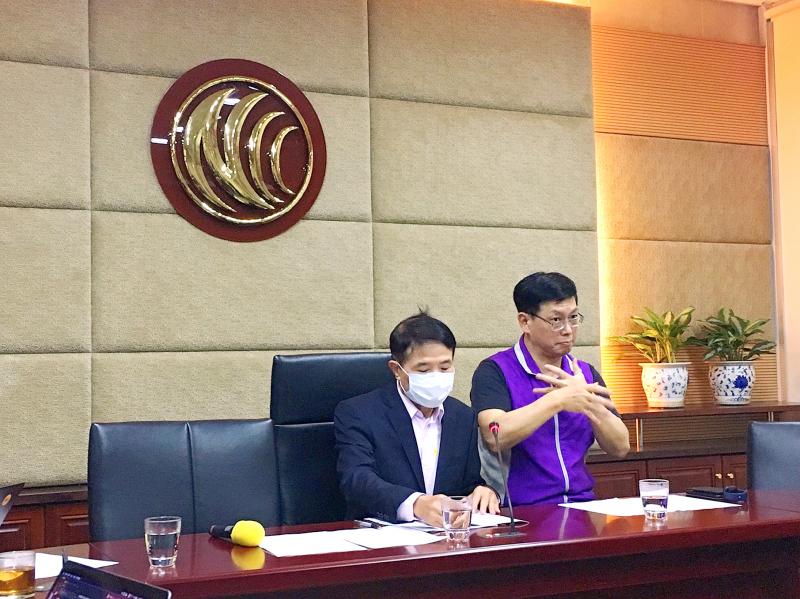The management of Mirror TV yesterday told the National Communications Commission (NCC) that it would not host any political talk shows during prime-time viewing hours once the channel is established, adding that it would retain a full-time ombudsman to monitor news quality.
The commission yesterday began reviewing an application filed in December 2019 by Mirror Media, which also owns a Chinese-language weekly magazine, to establish a TV news channel.
It ruled that it would resume deliberations after the channel provides additional information requested by commissioners.

Photo: Yang Mien-chieh, Taipei Times
Mirror Media president Pei Wei (裴偉) and National Chengchi University adjunct professor Weng Shieu-chi (翁秀琪) visited the commission yesterday morning to answer questions about the application, NCC Deputy Chairman Wong Po-tsung (翁柏宗) said.
NCC commissioners and the media group’s management discussed several issues, including the plan to recruit Weng as a full-time ombudsman to monitor the channel’s news programs.
“Weng told us that she accepted the job after reading the channel’s business plan, adding that she loves challenges and is interested in establishing an ombudsman system,” Wong said.
Weng said that as an ombudsman she would be a mentor, communicator and coach, and her job would be to ensure that the channel follows media regulations by verifying the authenticity of information before airing it, he said.
NCC commissioners asked if the ombudsman system could function as Weng has planned, as a similar system was unsuccessfully executed in CTi News before the commission rejected its license renewal last year.
The ombudsman at CTi News, Shih Hsin University vice president Chen Ching-ho (陳清河), testified in an administrative hearing last year that he did not have time to watch all of the channel’s programs and would only give advice from time to time.
Chen assumed a part-time position, but Weng has been offered a full-time position and would have an office and two assistants, Wong said.
Mirror Media’s news channel and weekly magazine would operate separately and have different shareholders, board directors and supervisors, Wong said.
Audio-visual content currently shown on the weekly magazine’s Web site would not be aired on the television channel, he said.
Meanwhile, the group plans to increase the number of employees at the news channel to 450. So far, it has recruited about 200 staff, including 41 people who were previously working at the magazine.
Unlike other local news channels, Mirror TV would not air political talk shows between 8pm and 10pm, Mirror Media told commissioners, adding that it would broadcast investigative reports during prime-time hours instead.
The channel would also devote a large part of its programming to reports on art and entertainment, international news and issues concerning children and teenagers.
The group said that the new news channel would be available on cable, as well as Chunghwa Telecom’s multimedia-on-demand (MOD) system.
In other news, the commission has yet to rule on Eastern Broadcasting Co’s application to have three of its channels that were airing overseas broadcast on the MOD system.

POSITIVE DEVELOPMENT: Japan and the US are expected to hold in-depth discussions on Taiwan-related issues during the meeting next month, Japanese sources said The holding of a Japan-US leaders’ meeting ahead of US President Donald Trump’s visit to China is positive news for Taiwan, former Japan-Taiwan Exchange Association representative Hiroyasu Izumi said yesterday. After the Liberal Democratic Party’s landslide victory in Japan’s House of Representatives election, Japanese Prime Minister Sanae Takaichi is scheduled to visit the US next month, where she is to meet with Trump ahead of the US president’s planned visit to China from March 31 to April 2 for a meeting with Chinese President Xi Jinping (習近平). Japan and the US are expected to hold in-depth discussions on Taiwan-related issues during the

‘LIKE-MINDED PARTNER’: Tako van Popta said it would be inappropriate to delay signing the deal with Taiwan because of China, adding he would promote the issue Canadian senators have stressed Taiwan’s importance for international trade and expressed enthusiasm for ensuring the Taiwan-Canada trade cooperation framework agreement is implemented this year. Representative to Canada Harry Tseng (曾厚仁) in an interview with the Central News Agency (CNA) said he was increasingly uneasy about Ottawa’s delays in signing the agreement, especially as Ottawa has warmed toward Beijing. There are “no negotiations left. Not only [is it] initialed, we have three versions of the text ready: English, French and Mandarin,” Tseng said. “That tells you how close we are to the final signature.” Tseng said that he hoped Canadian Prime Minister Mark Carney

President William Lai (賴清德) yesterday bestowed one of Taiwan’s highest honors on Saint Vincent and the Grenadines (SVG) Ambassador Andrea Clare Bowman in recognition of her contributions to bilateral ties. “By conferring the Order of Brilliant Star with Grand Cordon on Ambassador Bowman today, I want to sincerely thank her, on behalf of the Taiwanese people, for her outstanding contribution to deepening diplomatic ties between Taiwan and SVG,” Lai said at a ceremony held at the Presidential Office in Taipei. He noted that Bowman became SVG’s first ambassador to Taiwan in 2019 and

A man walks past elementary school artworks at the Taipei Lantern Festival in Ximen District yesterday, the first day of the event. The festival is to run from 5pm to 10pm through March 15.